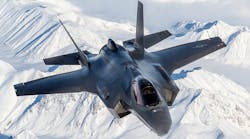The Canadian government announced it will enter into the final negotiations with the U.S. government and Lockheed Martin Corp. to purchase 88 F-35 Lightning II Joint Strike-Fighter aircraft for the Royal Canadian Air Force. It stated its choice – following a competitive bidding process – “will ensure the requirements of the RCAF are met while also providing value for Canadians, generating high-value jobs in Canada as well as further growth for the Canadian aerospace and defense sector”.
Canada has budgeted $15 billion (C$19 billion) for the purchase, which represents “the most significant investment in the RCAF in more than 30 years, according to Minister of National Defence Anita Anand. “This procurement project … will help ensure Canada can continue to defend North America, enhance our Arctic sovereignty and meet our NATO and NORAD obligations in the face of current and emerging threats,” she added.
The first aircraft will be delivered in 2025, pending final agreement.
The F-35 selection had been in process for several years, as the RCAF prepared to replace its CF-18 aircraft, a variant of the McDonnell Douglas/Boeing F/A-18 fighter jets. However, Canada previously eliminated Boeing’s Super Hornet from the process, and later opted against the Saab AB Gripen multirole fighter.
The F-35 Lightning II Joint Strike Fighter is a single-engine, Stealth-enabled aircraft designed for deployment for ground attack and combat, and available in three variants: F-35A, for conventional takeoff and landing (CTOL); F-35B, for short take-off and vertical-landing (STOVL); and the F-35C carrier-based variant for Catapult Assisted Take-Off But Arrested Recovery (CATOBAR) variant.
Lockheed notes that more than 770 F-35 aircraft have been delivered since 2015.
Canada has C$21.3 million for infrastructure improvements at two primary operating bases for its future fighter aircraft, to support long-term maintenance and operation.
The previous Conservative government in Canada had selected the Lockheed proposal, and Canada has been an investor in the Joint Strike Fighter Program since 1997, which oversees the F-35 supply chain.
Other nations participating in the Joint Strike Fighter Program are Australia, Denmark, Italy, The Netherlands, Norway, and Australia.
However, prior to his election, Prime Minister Justin Trudeau opposed Canadian purchase of the F-35.
“This announcement marks another important milestone in Canada’s competitive process to purchase modern fighter jets for the Royal Canadian Air Force. Canadians take great pride in their Armed Forces, and it is important to make sure that they have what they need to keep Canada safe and secure,” stated Minister of Public Services and Procurement Filomena Tassi.






